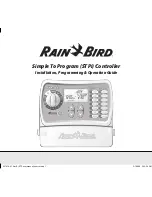
3-
4
3
I/O INTERF
ACE
3-2 Input Signal Description
■
Absolute point movement command (ABS-PT)
This command moves the robot to an absolute position of a point number specified by DI0 to DI9
along an axis coordinate whose origin is defined as 0, at a speed selected by DI10 or DI11. (See
"3-2-2 General-purpose input (DI0 to DI15)"). The robot axis can be specified with DI13 and
DI14 by enabling PRM10. (Refer to "PRM10: Control axis selection with I/O command".)
c
CAUTION
The DI0 to DI11 status must be confirmed before ABS-PT is executed. DI13 and DI14 must also be determined
when selecting an axis. (See "3-6-6 When executing a point movement command".)
■
Relative point movement command (INC-PT)
This command moves the robot a distance defined by a point number specified by DI0 to DI9
from the current position at a speed selected by DI10 or DI11. The robot axis can be specified with
DI13 and DI14 by enabling PRM10. (Refer to "PRM10: Control axis selection with I/O command".)
n
NOTE
Current position does not always indicate the actual robot position. More accurately, it is the current position data
stored in the controller. Each time a movement command is executed correctly, the current position data in the
controller is replaced with the target position data of the movement command.
Therefore, if the robot is stopped by an interlock while executing a relative movement command, re-executing the
same relative movement command moves the robot to the target position. (The robot does not move a relative
distance from the stopped position by the interlock.)
Similarly, after a robot movement command is executed, the controller still retains the target position data of that
movement command as the current position data even if you move the robot to another position by manual
operation.
When a relative movement command is executed under this condition, the robot moves the specified distance from
the target position of the movement command that was previously executed, rather than the actual robot position, so
use caution.
Current position data differs from the actual robot position when:
• Emergency stop or interlock (LOCK) was activated while the robot was moving.
• A communication command ^C (movement interruption) was transmitted while the robot was moving.
• The SERVICE mode input was changed while the robot was moving.
• The robot was moved by manual operation.
• The robot was moved by hand during servo-off (including emergency stop).
c
CAUTION
The DI0 to DI11 status must be specified before INC-PT is executed. DI13 and DI14 must also be determined
when selecting an axis. (See "3-6-6 When executing a point movement command".)
■
Automatic operation start command (AUTO-R)
This command executes the robot program continuously, starting from the current step.
All tasks are executed if the robot program is a multi-task program.
■
Step operation start command (STEP-R)
This command executes the robot program one step at a time, starting from the current step.
Only the selected task is executed even if the robot program is a multi-task program.
Artisan Technology Group - Quality Instrumentation ... Guaranteed | (888) 88-SOURCE | www.artisantg.com
















































